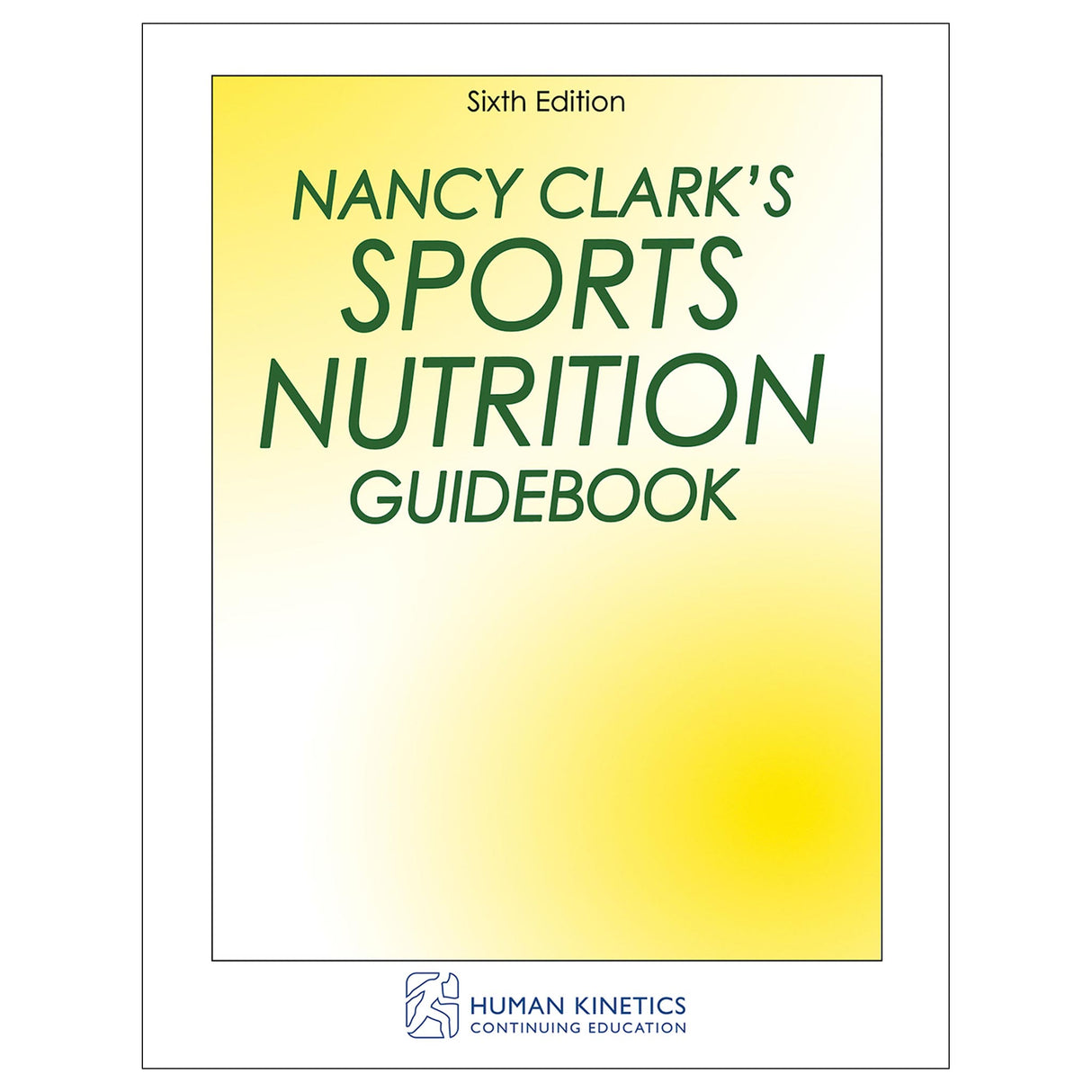Nancy Clark's Sports Nutrition Guidebook 6th Edition Online CE Course With Print Book
Author: Human Kinetics
$67.00 CAD
Human Kinetics strongly recommends that you complete your exam within the calendar year of your date of purchase to ensure approved credits do not expire for your organization.
- Nancy Clark’s Sports Nutrition Guidebook, Sixth Edition, book
- Online study guide
- Recorded webinar
- Online continuing education exam
In Nancy Clark’s Sports Nutrition Guidebook, Sixth Edition, you’ll get real-world advice from Nancy Clark, an internationally respected and trusted sports nutritionist. Find the latest research and information on what to eat before, during, and after exercise; sport drinks and energy foods; popular trends like keto and gluten-free diets; when and how much carbohydrate to eat; meal patterns that fit any training schedule; sustainability; and digestive issues. You’ll learn how to resolve confusion about what to eat daily so you can help your clients make healthy and informed dietary decisions. You’ll get practical tips regarding vegan, diabetic, gluten-free, low-FODMAP, and bariatric diets. You’ll also find help for athletes with anorexia and binge-eating disorders.
Clark’s practical suggestions for eating on the go will help you guide your clients to make good choices in any restaurant, café, drive-through, or convenience store. Learn about what to eat before and during exercise and events, how to refuel for optimal recovery, and what athletes need to know about relative energy deficiency in sport (RED-S). With 89 family-friendly recipes, you’ll be able to provide plenty of meal options for your athletes to fuel their performance.
The included webinar provides clarity on confusing sports nutrition information, and the activities in the study guide highlight important concepts from the book to prepare you for the continuing education exam.
Once you complete the course and pass the exam, you can print a certificate for continuing education credits.
Learning Objectives
- Identify the five categories of foods on the U.S. government’s MyPlate nutrition guide (www.ChooseMyPlate.gov), and describe a balanced meal or snack based on this guide.
- List at least four disease states that are less likely to develop when following a balanced sports nutrition plan.
- Name three examples of breakfasts that could be included in a balanced sports nutrition plan.
- Describe an appropriate eating schedule to allow an athlete to consume calories and nutrients at an even rate throughout the day.
- List high-energy, nutrient-dense foods that are easily included in the eating plan of a busy athlete or other active person.
- Identify the carbohydrate needs of an active person based on weight and describe a meal plan with sufficient carbohydrate.
- Determine daily protein needs, including what, when, and how much to eat to best meet those needs.
- Detail the negative effects of dehydration on performance and choose what quantity and types of beverages and foods to consume to promote adequate hydration before, during, and after exercise.
- Plan when and what to eat before exercise to prevent hypoglycemia, settle a nervous stomach, and fuel muscles for the most effective workouts, events, or competitions.
- Create a scientific fueling plan for both during and after exercise that will increase stamina, prevent cramping, and promote a quick and complete recovery.
- Decipher confusing nutrition information and make appropriate decisions about what kinds of supplements, performance enhancers, and engineered foods may be safe and effective.
- Identify and appropriately address nutrition-related issues affecting female athletes and active women throughout their life cycle.
- Plan athlete-specific nutrition guidance for athletes who are on teams, in power sports, in weight-class sports, or in ultraendurance or extreme sports; who compete in winter sports; or who are injured, older, or returning to exercise after gastric bypass surgery.
- Discuss methods for measuring body fat and address body weight, body fat, and body image issues for athletes.
- Identify the best nutrition guidelines for gaining weight as muscle mass, including protein requirements, boosting calories, and timing of meals and snacks.
- Explain the steps for losing body fat and maintaining weight loss in order to have energy to enjoy exercise and not feel deprived.
- Define, identify, and learn techniques to address eating disorders, food obsessions, and exercise addictions.
- List the benefits of beverage options for postworkout recovery.
Audience
Certified fitness instructors, personal trainers, strength and conditioning coaches, and athletic trainers.Chapter 1. Building a High-Energy Eating Plan
Chapter 2. Eating to Stay Healthy for the Long Run
Chapter 3. Breakfast: The Key to a Successful Sports Diet
Chapter 4. Lunch and Dinner: At Home, on the Run, and on the Road
Chapter 5. Between Meals: Snacking for Health and Sustained Energy
Chapter 6. Carbohydrate: Simplifying a Complex Topic
Chapter 7. Protein: Building and Repairing Muscles
Chapter 8. Fluids: Replacing Sweat Losses to Maintain Performance
Part II. The Science of Eating and Exercise
Chapter 9. Fueling Before Exercise
Chapter 10. Fueling During and After Exercise
Chapter 11. Supplements, Performance Enhancers, and Engineered Sports Foods
Chapter 12. Nutrition and Active Women
Chapter 13. Athlete-Specific Nutrition Advice
Part III. Balancing Weight and Activity
Chapter 14. Assessing Your Body: Fat, Fit, or Fine?
Chapter 15. Gaining Weight the Healthy Way
Chapter 16. Losing Weight Without Starving
Chapter 17. Dieting Gone Awry: Eating Disorders and Food Obsessions
Part IV. Winning Recipes for Peak Performance
Chapter 18. Breads and Breakfasts
Chapter 19. Pasta, Rice, and Potatoes
Chapter 20. Vegetables and Salads
Chapter 21. Chicken and Turkey
Chapter 22. Fish and Seafood
Chapter 23. Beef and Pork
Chapter 24. Beans and Tofu
Chapter 25. Beverages and Smoothies
Chapter 26. Snacks and Desserts
Appendix A. For More Information
Appendix B. Selected References





